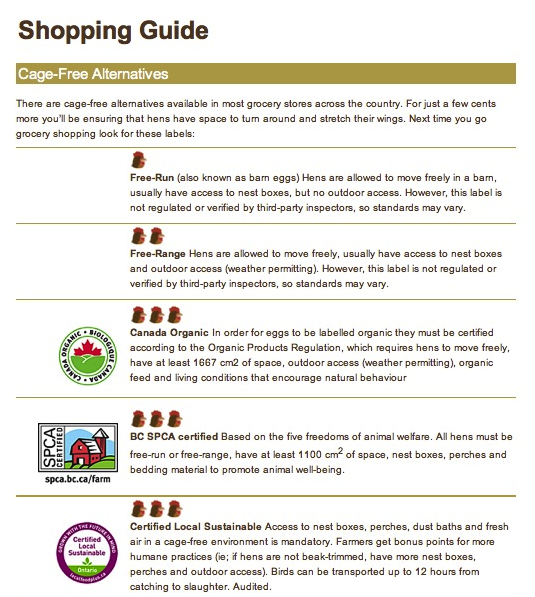Eggs don’t seem so complicated until you stand in front of the egg shelf at a grocery store wondering which kind to buy: regular, free-run, veggie-fed, Omega3, free range, and organic. If you feel this way, you are not alone. People who buy cage-free eggs care about two things: humane and healthy choices. But does paying extra really mean you are purchasing more ethical or healthier eggs?
The Canadian Coalition for Farm Animals suggests that 98% of Canada’s 26 million egg-laying hens are kept in small cramped battery cages. Each bird has less space than a sheet of notebook paper. Hens are forced to stand on sloping wire floors, and they suffer feather loss and skin damage due to constant rubbing against the cage and cage-mates.

Both free-run and free-range are not regulated or verified by third-party inspectors, and both housing systems do not necessarily provide more space than battery hen cages.
In Canada, verified systems of cage-free eggs include Canada Organic, BC SPCA Certified and Local Food Plus (Ontario).
To be certified organic, hens must be fed only organic feed and no animal by-products. Antibiotics cannot be used as a preventative measure although can be used in case of illness. When an antibiotic is used, the farm loses organic accreditation until after the treatment ends; therefore organic eggs should be healthier and safer, right?
According to one U.S. Department of Agriculture (USDA) report, there is no “meaningful” difference between organic egg and factory egg, and that “research in both the U.S. and the E.U. has shown that free-range chickens have higher levels of PCBs , simply because they get out more and can peck almost anywhere.”
Interestingly, another study also done by the USDA compared the nutritional data from the eggs produced by 14 flocks of free-range pastured hens and found that the eggs from pasture-fed hens contained “one-third less cholesterol and one-quarter less saturated fat, in addition to higher levels of vitamin A, beta-carotene, vitamin E and omega-3 fatty acids.”
Did you catch the reason why these two study results are so different? Free-range pastured hens! Next time you are at the grocery store think about choosing certified organic eggs or free-run and free-range eggs from local farms that you can visit and make sure the hens are ethically raised and pastured fed. You can find where to buy SPCA certified products in your region here.

